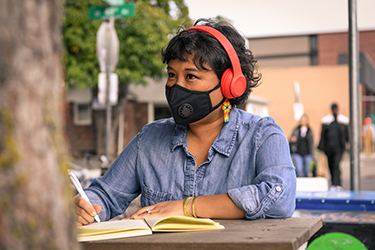Nearly 40% of U.S. college students lack consistent access to food, known as “food insecurity.” The findings correlate with sleep challenges and psychological distress, according to a study presented at the APHA Annual Meeting on Wednesday.
 The study used 2019-2022 data from the American College Health Association’s National College Health Assessment. 334,957 students completed the survey. Presenter Adam Hege pointed out that some of those years were during the peak of the COVID-19 pandemic.
The study used 2019-2022 data from the American College Health Association’s National College Health Assessment. 334,957 students completed the survey. Presenter Adam Hege pointed out that some of those years were during the peak of the COVID-19 pandemic.
Hege is associate professor of public health and undergraduate program director at Appalachian State University in Boone, North Carolina. All five presenters in Wednesday’s session, “The Health of U.S. College Students: What the Data Tells Us and How It Can be Used,” are part of a research team at Appalachian State University.
Hege’s study looked at how food insecurity was connected to psychological distress and four sleep variables: waking up too early, feeling sleepy during the day, having a hard time falling asleep and getting enough sleep to feel rested.
More than half the students (51%) reported moderate psychological distress, and another 21% reported serious psychological distress. The American Academy of Sleep Medicine recommends at least seven hours of sleep a night for adults. However, in the study, 43% of college students reported getting less than seven hours a night. In addition, 40% reported moderate sleep challenges, and 31% reported major sleep challenges.
“Sleep health is a major indicator of a lot of our public health outcomes,” Hege said. “Sleep has been shown to be associated with many of our chronic health conditions, having physiological impacts, mental health impacts.”
The undergraduate college years are an important time in a person’s lifespan, he said. However, college and university students in the 21st century have faced vast challenges, including rising costs of college education, mental health challenges and, more recently, the impact of the COVID-19 pandemic.
“Being food insecure led to increased odds of poor sleep or lower sleep duration,” Hege said. In addition, “as the psychological distress gets worse…the sleep duration gets worse.”
Hege said it is vital that policymakers and university officials address the social conditions and determinants of sleep. He said many colleges and universities are doing a good job focusing on individual health behaviors and providing health education.
“I’m a huge proponent of that, but I think we need to go further when it comes to policy going much more upstream as we promote public health.”
In addition, as colleges and universities focus on recruiting students, Hege asked: “Are we providing them the resources and services they need to actually be successful, to be healthy” once they get there?
COVID-related stress increased suicide risk among undergraduates
Another study by the Appalachian State University team showed that almost one-third of undergraduate college students were at risk for suicide during the COVID-19 pandemic.
Using the National College Health Assessment, the researchers studied risk for 65,142 undergraduates ages 18-29 who filled out the survey in spring 2021. Two-thirds were female, 74% were heterosexual, 52% were white, 3% Black, 15% Hispanic, 15% Asian and 15% multiracial. The research team measured suicide risk using a 10-item scoring system that assessed COVID-related stress, such as experiencing loss of a loved one and uncertainty about the future.
The team looked at variables that could buffer stress: social connectedness, resiliency and psychological flourishing. COVID-related stress increased the risk of suicide. Students who were older, non-binary, white or who were not heterosexual faced increased risk of suicide.
However, social connectedness among the students lowered their risk — and the length of the social interaction was significant. Higher levels of resiliency and psychological flourishing decreased suicide risk as well, said presenter Martie Thompson, the Blue Cross NC Distinguished/Endowed Professor at Appalachian State University.
However, Thompson pointed out that “regardless of their level of social connectedness, resiliency and flourishing, we were still seeing a main effect for COVID-related stress increasing the risk for suicide.”
In fact, she said, “When students had low levels of social connectedness, resiliency or flourishing, the association between COVID-related stress and suicide risk was about twice as high as when students had relatively high levels of those resources.”
In the future, the team would like to examine other factors that could buffer against the negative effects of COVID-related stress and also look at how the pandemic affected mental health in different subpopulations and whether being in a marginalized demographic group affected mental health during the pandemic.
“Public health professionals and college administrators need to explore ways to incorporate a focus on these moderators — social connectedness, resiliency and psychological flourishing — into the prevention programming that is already happening on campuses, especially in times of uncertainty, stress and fear,” Thompson said.
She added that it’s important to involve the students in developing these intervention strategies that are specific to each campus.
Photo by Justin Katigbak, courtesy Disabled and Here, via Creative Commons.